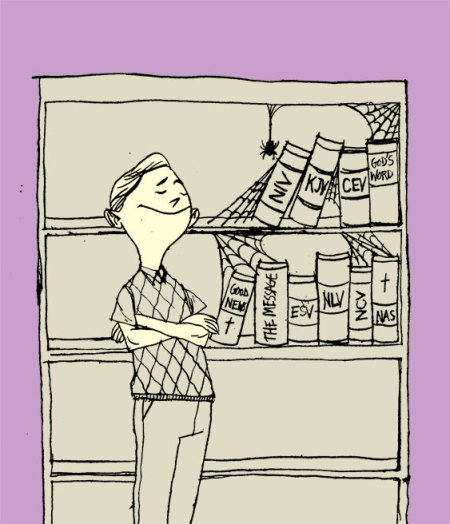Is Poverty a Sign of Sin or Virtue? Not Necessarily, the Bible Says

At first glance, the Bible demonstrates that God cares about the poor and about how they are treated. Scripture clearly warns of the dangers of wealth and has harsh things to say about the rich. To pick just a few examples from the Gospel of Luke, Jesus tells us:
Blessed are you who are poor, for yours is the kingdom of God;...woe to you who are rich, for you have received your consolation; ...sell all that you have and distribute to the poor, and you will have treasure in heaven; ...it is easier for a camel to go through the eye of a needle than for a rich person to enter the kingdom of heaven (Luke 6:20, 24; 18:22, 25).
Jesus even tells us that, in the end, we will be judged on how we treat those who are poor and powerless (Matt. 25:31-46).
Should we conclude from this that God is on the side of the poor and opposes the rich? This is a tempting conclusion and one that is endorsed by some very prominent people in the church, but is it supported by a careful reading of scripture?
Understanding the Poor
To determine whether God is on the side of the poor and opposed to the rich, we must first understand whom the scriptures mean when they talk about these groups.
Starting with the poor (although some passages talk about poverty metaphorically), in the vast majority of cases, the word refers to material poverty—people who are hungry, naked, homeless, etc. Economic poverty is also typically accompanied by a broader lack of resources and connections that makes the poor particularly vulnerable to oppression and abuse. They are frequently identified as widows, orphans, and foreigners who also lack social connections.
Throughout the Old Testament, God warns against mistreating the poor, the widow, the orphan, and the foreigner, and promises to judge those who abuse them. Clearly, treatment of the poor and disadvantaged is a very important part of biblical ethics.
At the same time, this does not mean that the poor are de facto virtuous.
To be sure, poverty is not necessarily a sign of God's displeasure. The poor can be blameless (Prov. 28:6) and wise (Eccles. 9:15). But other scriptures warn us that drunkenness, gluttony, and laziness can cause poverty (Prov. 23:21), as can chasing fantasies (Prov. 28:19).
The Bible also warns about the danger of some temptations that are particularly enticing for the poor. The most obvious temptation is theft to get food. This can be easily extended to other types of criminal behavior motivated by the need or desire for money, including gang-related activities, drug dealing, etc. This in turn points to the reality of 1 Timothy 6:9-10:
But those who desire to be rich fall into temptation, into a snare, into many senseless and harmful desires that plunge people into ruin and destruction. For the love of money is a root of all kinds of evils. It is through this craving that some have wandered from the faith and pierced themselves with many pangs.
This passage is frequently associated with those who are already rich, but the rich are not the group being addressed; it is those who desire wealth, and specifically those who are not yet rich, who are being cautioned here. This is an important reminder that greed and worship of money are not vices peculiar to the rich. In fact, the people I know who are most obsessed with money are not the wealthy but those who have to struggle to get by.
Envy of the rich is another sin that scripture warns against (e.g., Ps. 73). This ties in directly to the 10th Commandment, which forbids coveting a neighbor's possessions. The classical definition of envy is the desire to tear down anyone who is ahead of oneself, to take away what is that person's because he or she has more than oneself. Whether one cloaks this in the language of "fairness" or "income redistribution," envy and covetousness remain sins.
Poverty: Not Necessarily "Blessed" or "Virtuous"
In other words, the Bible is realistic about the causes of poverty: people can become poor through no fault of their own, but poverty can also be the result of foolish decisions and actions; further, there are some sins to which the poor are particularly susceptible. Poverty is thus not a guarantee of virtue or righteousness.
So why are the poor described as blessed?
The issue is not poverty per se, but rather the attitude of humility and reliance on God that it can produce in us. This is why Matthew's version of the beatitude isn't just "Blessed are the poor," but "Blessed are the poor in spirit" (Matt. 5:3). Reliance on personal wealth or government help (Ps. 146, especially verses 3-4, 7-10) for security is foolish because they do not last. Rather, we need to place our hope in God alone.
Dr. Glenn Sunshine is Professor of History and Department Chair at Central Connecticut State University, a Research Fellow at the Acton Institute, and a faculty member for the Colson Fellows Program. Dr. Sunshine holds a B.A. in Linguistics from Michigan State University, an M.A. in Church History from Trinity Evangelical Divinity School, and a Ph.D. in Renaissance-Reformation History from the University of Wisconsin-Madison. He is the author of Why You Think the Way You Do. He and his wife, Lynn, have two children.
This article is used with permission from the Institute for Faith, Work & Economics (www.tifwe.org). The original article appeared here. IFWE is a Christian research organization committed to advancing biblical and economic principles that help individuals find fulfillment in their work and contribute to a free and flourishing society. Visit https://tifwe.org/subscribe to subscribe to the free IFWE Daily Blog.





















